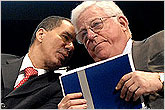 Gabriel Bouys/Agence France-Presse — Getty Images
Gabriel Bouys/Agence France-Presse — Getty Images Updated, March 5, 1:40 p.m. | Anna Everett, a professor of film and media studies, joins the discussion.
The Academy Awards, to be presented on Sunday night, have always been an occasion to flaunt the glitz and pageantry of the American movie business. But do the Oscars promote artistry and experimentation in filmmaking or do they undermine innovation by rewarding tried-and-true approaches? Has the impact of the awards on the film industry changed in the last 40 years?
- Vivian Sobchack, film professor, U.C.L.A.
- Christopher Rosen, writer on television and movies
- John Beifuss, film critic
- Maria Elena de las Carreras, film historian
- Jonathan Rosenbaum, film critic
- Anna Everett, film professor, U.C. Santa Barbara
- Yoni Brenner, screenwriter
Creativity and Copycats

Vivian Sobchack is a professor at the U.C.L.A. School of Theater, Film and Television. She has served as president of the Society for Cinema and Media Studies and on the board of directors of the American Film Institute, and is author of “Carnal Thoughts: Embodiment and Moving Image Culture.”
The Academy Awards have had an impact on American filmmaking in both good and bad ways. On the one hand, both nominations and awards have brought significant attention to independent and “little” films that otherwise might have gone relatively unnoticed.
Despite the average tastes of voting Academy members, there’s respect for the magnificently far out.
Many of these may well fall into the “tried-and-true” tradition of Hollywood narratives but others do not. This recognition also makes a critical difference to independent filmmakers trying to secure financing and distribution for their next films. (The down side to this positive recognition is that, too often, the next film is less “independent” and less likely to be “experimental.”)
On the other hand, both nominations and awards — particularly those attached to financially successful films — tend to quash creativity. Recognition of the tried-and-true when it makes money tends to create copycats and more of the same.
The Best Cliché We Have

Christopher Rosen is a freelance writer on television and movies for The New York Observer. He also writes at his blog, 42 Inch Television.
“It’s an honor to be nominated.” That cliché has been the mating call of Academy Award losers since Hollywood’s Golden Age.
 Top to bottom: Associated Press/Summit Entertainment, Associated Press/20th Century Fox “The Hurt Locker” and “Avatar” are nominees for Best Picture.
Top to bottom: Associated Press/Summit Entertainment, Associated Press/20th Century Fox “The Hurt Locker” and “Avatar” are nominees for Best Picture. And chances are those words will get trotted out once again on Sunday night, like a once-prized show horse well past its racing days. Don’t be surprised to hear it, post-telecast, from someone like Best Supporting Actress nominee Maggie Gyllenhaal. Just because it’s a cliché, though, doesn’t make it any less true. (And yes, that in and of itself is a cliché.)
Laugh if you want about the ignorance of giving out awards for subjective art — really, was the performance of guaranteed Best Supporting Actor winner, Christoph Waltz in “Inglourious Basterds,” that much better than the other four nominees in his category? — or say the Academy Awards “debase film culture,” as New York Press critic (and all-around curmudgeon) Armond White recently suggested.
The Cinephile’s Dilemma

John Beifuss has been the film critic at The Commercial Appeal, the daily newspaper in Memphis, since 1996. He currently is helping to organize “The Sivads of March,” a tribute to the late Watson Davis, who, as “Sivad, the Monster of Ceremonies,” was Memphis television’s horror-movie host in the 1960s.
Cinephiles, film snobs, fans — whatever you call those of us who love, study and devote too much of our time to watching shadows on a screen (or their modern pixelated equivalents), we have a secret: Most years, we don’t really want the Oscars to recognize the movies we believe are the “best.”
The vexing, validating, useful, irrelevant, happy and dire ceremony known as “the Oscars.”
We may wish that, say, the insinuating “Summer Hours” somehow had been nominated for Best Picture alongside the demonstrative “The Blind Side” (a Memphis story shot in Atlanta), but, like the followers of obscure bands or niche cult novels, we cherish the secret handshake shared by those who understand that “Dead Man” (and not Oscar’s “The English Patient”) was the “best” picture of 1996, and that “Mulholland Drive” — or “Mulholland Dr.” (yes, we’ll debate that) — was the best of not just 2001 but of its traumatic decade.
After all, what would happen if, for example, Todd Haynes’ “Safe” had won Hollywood’s top honor and outgrossed “Jaws”? Would the startled Earth fling us into space, as in 1937’s “The Man Who Could Work Miracles”? Would dogs and cats live together, to paraphrase Bill Murray?
Kurosawa in Hollywood

Maria Elena de las Carreras, a Fulbright scholar from Argentina, is a visiting professor at University of California, Los Angeles and Cal State Northridge. She is a regular collaborator of the Los Angeles Latino International Film Festival and the Latin American Cinemateca of Los Angeles.
French writer and cultural minister André Malraux once noted that cinema is an industry that sometimes disguises itself as art. The paradox at the heart of film — an object manufactured for mass consumption as well as a thing of beauty capturing the human experience — is also one embedded in the Academy itself.
The Oscars have always helped familiarize American audiences with foreign cinema.
It is after all a trade organization founded in 1927 to counter the notion that Hollywood was a purely business proposition.
There is no mathematical formula to gauge the economic impact of an Oscar nomination or win on a given film. Similarly, it is difficult to argue that the Academy Awards promote artistry and experimentation, since there are so many other factors at play when a member casts his vote.
Too Many Greats Ignored

Jonathan Rosenbaum, a former film critic for The Chicago Reader, is the author of the forthcoming “Goodbye Cinema, Hello Cinephilia” and writes at jonathanrosenbaum.com.
Occasions when Oscars promote rather than undermine artistry are rare, and there has been little progress over the years, despite the nomination of “The Hurt Locker.” The point of the awards is industry ratification and promotion, not art appreciation.
I’ll rethink my skepticism the day Albert Brooks gets nominated for writing or directing something.
This is especially true if one discounts the various consolation prizes constituting the only Oscars ever given to giants of American cinema like Cary Grant, D.W. Griffith, Howard Hawks, Alfred Hitchcock or Buster Keaton; and of course John Cassavetes and Erich von Stroheim never even got that much. (Indeed, when Richard Dreyfuss presented Steven Spielberg with an Irving Thalberg award in 1987, he praised Thalberg specifically for “standing up to Stroheim,” in other words, for eviscerating Stroheim’s “Greed.”)
The most striking exceptions that come to mind — the three awards to “Sunrise” in the first year of Oscars (1927), or the one for best original screenplay that went to Herman J. Mankiewicz and Orson Welles for “Citizen Kane” (1941) — only prove the rule.
A Question of Diversity

Anna Everett is professor of film and media studies at the University of California, Santa Barbara. She is completing a book on the media coverage of President Barack Obama.
The Academy Awards have helped to encourage experimentation in filmmaking, but clearly not enough; and clearly the Academy has not done enough to promote racial diversity.
When might a Spike Lee or a Julie Dash be recognized for their artistic innovations?
For black artists, recognition in top categories like Best Director, Best Picture and Best Actor/Actress remains very rare, though more black actors (male and female) are being recognized than before. Too often though, the Academy seems satisfied with merely having high-profile black nominees, or with awarding Oscars to black artists who appear in limiting or stereotypical roles.
Consider, for example, in 2007 when the two black actors were nominated for Best Actor: Forest Whitaker in “The Last King of Scotland” (a biopic of the Ugandan dictator Idi Amin), and Will Smith in “The Pursuit of Happyness” (a rags-to-riches story of a devoted father, Chris Gardner). The Oscar went to Whitaker for his masterful portrayal of Amin.
A Matter of Interpretation

Yoni Brenner is a writer for film and print. He co-wrote the animated movie “Ice Age: Dawn of the Dinosaurs” for Fox Animation/Blue Sky Studios.
Do the Oscars promote artistry or undermine it?
I’ll begin with a quote from Knute Ooldenfrug’s brilliant film “En Fruktansvärda Armbågar” (“The Terrible Elbows”) — one of the 10,000-odd films not to be nominated for “Best Picture” this year:
FREIDRICH: Din häst står i lågor.
MATS: Jag vet, pappa. Jag vet.
What does this mean? I don’t know. Why am I quoting it? I’m not sure. Am I making all of this up? Probably.
Point is, (besides the inherent pleasures of plugging random phrases into Google Translate,) the Oscar isn’t really a prize for originality or experimentation or fictitious-envelope-pushing-pseudo-Scandinavian-anti-drama; but for polished, internally coherent, Hollywood (or Hollywood-style) movies.
Considering the spectacular technical and creative virtues of this year’s nominees, it’s silly to posit that the Oscars discourage artistry. But Oscar-lust inevitably nudges certain filmmakers in less avant garde-y directions.
So let’s adjust the terms: the Oscars promote Hollywood artistry. Or, in the words of Knute Ooldenfrug, “Finns en giraff i min dusch.”










 Six authors read favorite passages from books they would never discard.
Six authors read favorite passages from books they would never discard. 

